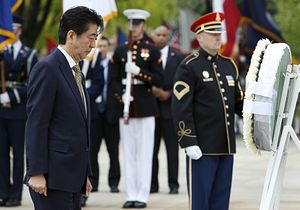As the world prepares to commemorate the 70th anniversary of World War II’s conclusion, countries victimized by Japan are renewing their demands for an honest reckoning of history. Such pleas, though understandable, are misplaced; for although Japan stands as one of the twentieth century’s most egregious offenders, it has also become one of the most persistently remorseful countries in recent history. This stands particularly true in light of other atrocities whose anniversaries we recognize in 2015.
Almost exactly 100 years ago, the Ottoman Empire began a systematic effort to deport and destroy the Armenian minority in its eastern provinces. The setting was World War I, and the German-allied Ottomans had grown deeply worried that its Armenian community might prove susceptible to Russian influence. To preempt such an alliance, more than 1.5 million Armenians were uprooted and deported to Syria and Mesopotamia. “We will not have Armenians anywhere in Anatolia,” the Ottoman minister of the interior remarked to a U.S. ambassador. “They can live in the desert, but nowhere else.”
For most of these individuals, however, relocation was only the beginning. En route to their place of exile, starvation, abduction, rape, and murder ensued on a massive scale. A U.S. diplomat in northern Syria wired Washington with news of massive burial grounds containing tens of thousands of Armenian bodies, while the U.S. ambassador to Turkey reported an “attempt to exterminate a race.” Between 600,000 and 1.5 million are believed to have perished as a result.
Despite hard evidence of the tragedy, the Turkish government is loath to admit responsibility. While the government admits to some regrettable Armenian deaths, such misfortune was simply part of a larger loss of life brought about by the War – but certainly not genocide. Perhaps worse, the Turkish government labors hard to dissuade other countries from being too critical, most recently recalling its ambassador to the Vatican after Pope Francis called the event the “first genocide of the 20th century.” The United States has not shown such courage.
This year marks the anniversary of another, lesser-known tragedy. In 1965, an alleged communist coup in Indonesia triggered an anti-communist purge, resulting in the death of up to one million and the imprisonment of another million more. Communists were not the only targeted group, as even moderately left-leaning individuals found themselves hunted by the military and police. According to a scholar at the Australian National University, killing was “done face-to-face… It’s not like the mechanical process that the Nazis had, or Pol Pot’s farms.”
While a 2012 investigation by Indonesia’s National Commission on Human Rights found the government guilty of systemic crimes against humanity, little has happened as a result. The attorney general, who would have spearheaded efforts to prosecute responsible parties, rejected the report in total and returned it to the Commission. Many government officials consider the campaign to have been essential to keeping communism at bay.
Enter Japan, whose Greater East Asia Co-Prosperity Sphere led to the death of three to 10 million civilians throughout northeast and southeast Asia. Perhaps the most damning legacies of Japanese colonialism involve compulsory recruitment of “comfort women” (or sex workers) and bio-chemical experimentation on innocents. Victims of these atrocities have been slow to forgive Japan, and understandably so.
But 70 years later, Japan is a very different place, and one that has been remarkably forthcoming about its past transgressions. Most Japan apologists point to landmark statements from Chief Cabinet Secretary Yohei Kono and Prime Minister Tomiichi Murayama in the early 1990s, but in point of fact, Japanese officials have expressed remorse on more than 40 occasions since 1945. Some statements have been directed toward particular countries or classes of victims, while others were blanket apologies. Even Prime Minister Yasuhiro Nakasone, considered one of the most nationalistic leaders of the postwar period, apologized to the world for the “ultra-nationalism” and “untold suffering” caused by Japan during the war.
Furthermore, consistent with its terms of surrender, Japan provided reparations (often through loans and grants) to many of its wartime victims, including Vietnam, Philippines, Indonesia, Myanmar, and South Korea.
To be sure, Prime Minister Shinzo Abe’s words and actions often contradict these efforts. He has done Japan no service, for example, by questioning the definitions of aggression and coercion. Even so, he has signaled that he will maintain the apologetic spirit of the Murayama Statement (which he did just last week). And notably, the Japanese public appears to support these expressions of remorse.
Japan is far from guiltless, but it is also far from unrepentant. The region and world would benefit from taking Japan at its word, focusing on the opportunities of the future rather than the hardships of the past.
Ken Marotte received his M.A. in East Asian Studies from The Ohio State University. He writes on issues of regional security and historical memory, and is an instructor of Japanese history at Aquinas College in Grand Rapids, Mich. He can be reached at ken.marotte [at] gmail.com

































